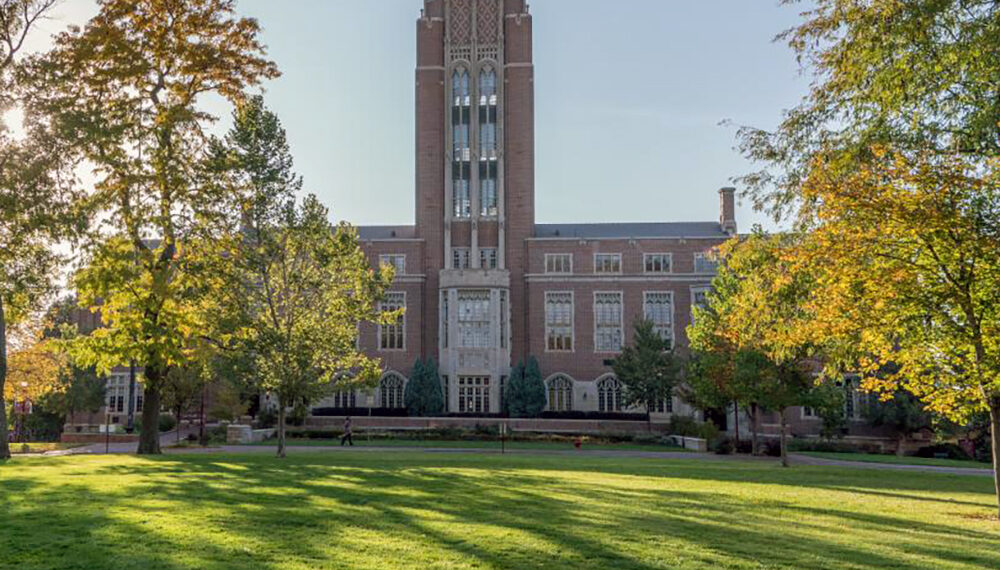
University Of Denver Settles Equal Pay Lawsuit
University Of Denver Settles Equal Pay Lawsuit
The EEOC announced in a press release that the University of Denver female full professors at the University’s Sturm College of Law were paid an average of nearly $20,000 less than their male counterparts. The University of Denver will pay $2.66 million and furnish other relief to settle a pay discrimination lawsuit brought by the U.S. Equal Employment Opportunity Commission (EEOC), the federal agency announced today.
The EEOC’s lawsuit charged that the university violated federal law by paying a class of female full professors at the Sturm College of Law lower salaries than it paid to their male counterparts who were performing substantially equal work under similar working conditions.
According to the EEOC’s lawsuit, as of October 2013, salaries of female full professors were on average, $19,781 less than those of male full professors, and all the women’s salaries were below the average salary paid to men. Despite formally recognizing the significant pay disparity in a 2013 memo, the university declined to take corrective action by adjusting salaries of female full professors.
Such alleged conduct violates the Equal Pay Act of 1963 and Title VII of the Civil Rights of 1964, which both prohibit discrimination in compensation based on sex. The EEOC filed its lawsuit, EEOC et al. v. University of Denver, Case No. 1:16-cv-02471-WYD-MJW, in 2016 in U.S. District Court for the District of Colorado, after first attempting to reach a pre-litigation settlement through its conciliation process.
“The favorable resolution of this case is a clear example of the EEOC’s commitment to fully enforcing our federal laws against pay discrimination. I hope cases like these get the attention of all employers and lead them to not only review their pay practices, but take action to address discrimination when they find it.” said EEOC Acting Chair, Victoria A. Lipnic.
In addition to $2.66 million in monetary damages to seven female full professors who participated in the lawsuit, the consent decree settling the suit also requires the University of Denver to increase the 2018 salaries of the seven female professors; annually publish salary and compensation information to tenure, tenure-track, and contract faculty; and employ a labor economist to conduct an annual compensation equity study.
The university will also work with an independent consultant to review methods and criteria used to determine pay and compensation, and these standards used to determine raises each year will be announced to the faculty in advance of the academic year. The independent consultant will also assist the university to revise its anti-discrimination policies and to conduct an informational campaign and training on those anti-discrimination policies. The decree will remain in effect for six years, but may end a year early based on an established record of compliance. While the decree is in effect, the independent consultant will provide regular progress and compliance reports to both the EEOC and the University of Denver. The court approved the settlement and will retain jurisdiction while the decree is in effect.
Noting the importance of protecting civil rights, Senior District Judge Wiley Y. Daniel, who approved the consent decree, stated during the hearing: “We need to make sure we learn from our history and we understand the importance of moving forward, not backwards, moving forward, not sideways.”
“The Equal Pay Act and Title VII are clear that pay discrimination based on a person’s sex is a violation of federal law – no exceptions,” said EEOC Regional Attorney Mary Jo O’Neill. “As we just recently marked Equal Pay Day, the EEOC remains committed to elimination of pay discrimination in the workplace.”
Phoenix District Director Elizabeth Cadle said, “This resolution is an excellent result, not only for the seven women who will receive compensation and salary increases to address past pay inequities, but also for other faculty members who will benefit from increased pay transparency and an annual pay equity study targeted at preventing similar inequities from arising in the future.”
The University of Denver is a private research university in Denver made up of 13 undergraduate and graduate schools and colleges.
The EEOC’s Phoenix District Office has jurisdiction over Arizona, Colorado, New Mexico, Utah, and Wyoming.
The University of Denver Sturm College of Law is a top 100 law school with nationally ranked programs in environmental and natural resources law, legal writing, clinical training, trial advocacy and tax law. Our curriculum is innovative and global in its perspective, and our faculty members are some of the finest in the nation. They love to teach, and they recognize that the people filling their classrooms today are the same people who will shape tomorrow’s legal landscape. It’s their passion and commitment that makes Denver Law stand out from the rest.
Upon graduation, our students are equipped with the skills necessary to provide immediate and valuable contributions to the legal community. Not only are they comfortable drafting a brief or presenting an oral argument, but they are also dedicated to upholding the highest ethical standards of their profession. In keeping with being a private law school dedicated to the public good, each Denver Law student is required to perform a minimum of fifty hours of supervised public service work as a prerequisite to graduation. Students effectively integrate the theory of law with the practice of law while understanding their obligation to perform pro bono work and contribute to their community as practicing attorneys.
We offer substantive law courses—some of which cannot be found anywhere else in the nation—in Spanish and Russian and numerous unique writing courses, including those that teach students how to draft pre-trial motions and to negotiate and draft agreements. Our move to the state-of-the-art Frank H. Ricketson Jr. Law Building – the first LEED-certified Gold building in the U.S. – allowed for increased integration of the most sophisticated classroom technology. To distinguish themselves from graduates of other top law schools, Denver Law students can opt to earn certificates in one of six specialty areas of the law: Environmental and Natural Resources; International; Workplace; Corporate and Commercial; Constitutional Rights and Remedies; and Intellectual Property. These certificates are welcomed by prospective employers, as they illustrate that a Denver Law graduate has achieved mastery in a specific subject area.
Experiential approaches to legal education have been a part of the law school’s curriculum for well over a century. Denver Law was a pioneer in the development and offering of clinical programs, opening its first legal aid dispensary in 1904. Our Experiential Advantage Curriculum combines live client clinics, high-quality externships, and legal simulation courses to provide a full year of practice-based learning to every Denver Law student who chooses to participate. And our Legal Externship Program is among the largest of its kind in the nation, placing approximately 500 students a year in positions that augment classroom learning with hands-on practice.
Whether you are seeking a comprehensive and strong J.D. degree, want to supplement your legal knowledge with a dual degree, or earn a graduate degree, Denver Law has you covered. And we haven’t even mentioned the location! Denver and its surrounding environs offers countless recreational and cultural opportunities within minutes of the classroom. In recent years, Denver has been named both the best city in the U.S. and the best city for business and careers, and it regularly ranks as one of the nation’s best states for recreation. It’s important to balance work and play when in law school, and there’s no better place to achieve that balance than at the Sturm College of Law.
The Sturm College of Law at University of Denver (Sturm) has an application deadline of June 1. The full-time program application fee at the Sturm College of Law at University of Denver (Sturm) is $65. The part-time program application fee at the Sturm College of Law at University of Denver (Sturm) is $65. Its tuition is full-time: $49,022 and part-time: $35,978. The student-faculty ratio is 5.5:1.
Recent Posts
Categories
- Attorney Marketing (4)
- Banking (5)
- Business Law (42)
- Child Custody (3)
- Court Cases (95)
- Criminal Defense (96)
- Discrimination (15)
- Divorce (1)
- Drug Crimes (4)
- DWI (1)
- Employment (24)
- Environmental (3)
- Family Law (1)
- Featured Articles (6)
- Identity Theft (1)
- Immigration (6)
- Latest News (123)
- Law Enforcement (8)
- Lawsuit (7)
- Medical (11)
- Personal Injury (3)
- Real Estate (1)
- Resources (88)
- Tax Law (13)
- Trademark (2)
- White Collar Crime (34)
RELATED ARTICLES

Attorney Review Guide (ARG) is a consumer-driven website focused on helping people in need of legal representation find the right attorney for their specific need. This means finding not only an attorney who practices in a specific field or geographical location, but one who is truly qualified and capable of handling your case effectively.
Company
About Attorney Review Guide
Support & Troubleshooting
Terms
Privacy Policy
Contact Us
Careers
Legal Marketing









